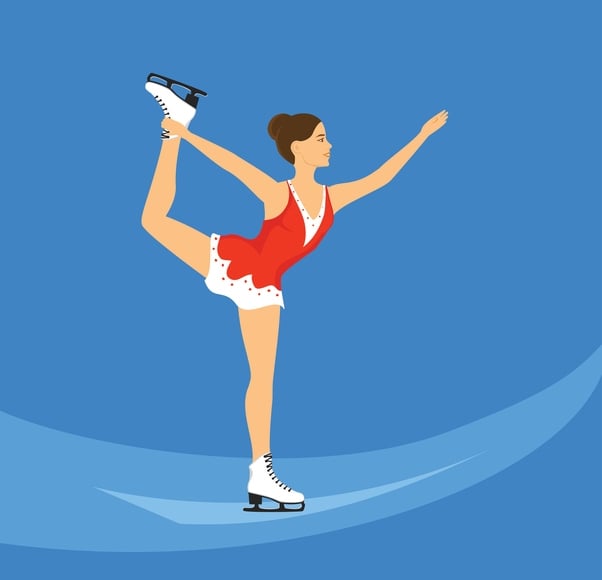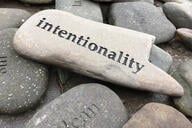You have /5 articles left.
Sign up for a free account or log in.

iStock/Vectorovich
Six weeks and 13 hours -- or to be less precise, forever! That is how long I had to wait till I was allowed to lace up my skates and get back on the ice after I severely injured my ankle recently. It is not a common hobby, but I figure skate and am completely addicted to it.
I can’t recall when I saw figure skating for the first time on TV as a child, but I do remember I was immediately hooked and that I’ve watched it with great awe ever since. I grew up in Israel -- the land of milk, honey and, at the time, no ice rinks -- so it was only when I moved to New York City as a young adult that I decided to go for it and enroll in Learn to Skate. I was progressing and starting to work on some jumps when I got pregnant and decided to give up the hobby. Yet while having kids took me away from skating at first, thanks to them it is now an integral part of my life again, as I now get to skate with them.
January is National Skating Month, and being energized by all the wonderful skating in the 2018 U.S. Figure Skating Championships that recently took place and the upcoming Olympics, I’ve decided to combine two passions of mine: figure skating and career advice. Here are some lessons I’ve learned from figure skating that you can apply to your career development.
Know it’s never too late to start something new. It took me almost a decade to return to skating, and in a sport dominated by teens, I could have concentrated on lost opportunities. But that wouldn’t bring back time or change anything. In both skating and a career, you need to focus on what you are doing now and what you will do in your future. I often hear from Ph.D. and postdoc students that they are worried it is too late for them to transition to something new, especially after they put in all these years of study and training. But you shouldn’t let your age or years of education stop you from pursuing your interest or newly discovered passion. It won’t necessarily be easy, but that doesn’t mean you need to give it up (or let others discourage you) because “it’s too late.”
Have courage. I still remember the first time I skated in a freestyle session -- ice time for advanced skaters. I was a bit terrified by all the young skaters swooshing gracefully by me, but fortunately my beloved coach helped guide me through it. Still, it definitely took some courage (and time) to get comfortable and own my share of ice.
Similarly, when it comes to your professional life, at some point or another, we all need to tap into our courage to advance in life -- whether it is just leaving what’s been familiar and comfortable in our current position for a new role, switching from an academic environment to a corporate one, or emailing someone we don’t know for an informational interview. To progress, we all need that little bit of courage, and just like the lion in The Wizard of Oz, we might not realize it does already exist within us.
Push sideways to move forward. In figure skating, you are actually pushing to the sides to move forward. Similarly, a professional lateral move is often needed to propel you forward. These days, people change jobs on average 17 times throughout their career. That sounds like a lot, especially when you’re coming from academe and are used to a pretty linear career path. But I once heard someone make the analogy of the board game Chutes and Ladders when it comes to a career: you often go sideways to move up, and as long as you don’t go all the way down, you can have a great career.
Be coachable. One of the reasons I love skating is because I love learning new things and being challenged. But to learn them, I have to listen, seek guidance and advice from the right people, and be willing to try new ways of doing things -- even if such new approaches feel awkward at first. In sum, I need to do what it takes to be better.
If we take this concept off the ice -- to enhance your professional development -- it suggests you should be sure to take advantage of your university’s career development events, schedule one-on-one time with your postdoc/grad school office staff and find the people who can coach you and help you reach your goals through informational interviews and networking.
Discover an amazing community. In the two short years that I have been skating, I’ve met adult skaters of all ages from all walks of life and from across the world who inspire me on multiple levels. It is an amazing and supportive community that I am honored to be part of. Finding people who share your interest, passion or even just job search woes will provide you with the opportunity to learn from their experiences, enjoy their support and commiserate with them when needed.
Stay on an edge. Skating is done on edges, and the deeper the edge the better. Once you made the transition to your first job, don’t forget to keep your edge so your value doesn’t diminish. Always keep learning and expanding your skills to stay relevant and valuable.
Have patience. To be honest, “She was known for her patience” will most likely not be written on my tombstone. As a wise skater once told me, “Progress in skating is done in millimeters,” and -- oh, my -- it is hard and frustrating at times. Same goes for your professional development: you don’t become an outstanding leader or land your dream job in a week. Hard as it may be, you should keep your expectations realistic and understand that, whether it is a career change or a new skill you’re after, it will take time. And that, in the end, thing usually do fall into place.
Realize it’s about how we get up. Just over a year ago, the U.S. Figure Skating Association launched the Get Up campaign: “Ice is slippery, and so is life” and “It is how we get up that matters.” We are all going to have bad days (or a bad skate); we are all going to fall. And we all have to overcome some roadblocks at different points in our lives. It can be a harsh committee meeting, a rejected paper or a “no, thank you” response for a job you really wanted. Whatever it is, it is how you get up and keep moving forward that matters -- even if it is done in very small steps.
So if you stumble, don’t let it define you. Keep your chin up and get back up. (If you need some inspiration, check out the story of Mirai Nagasu, who will be representing the United States in the upcoming Olympics.)
In conclusion, one of the first things I learned from my coach is that the head is the heaviest part of the body, and you will be heading in the direction to which your head is facing. So keep your focus on the direction where you’d like to be headed. And I hope that with these lessons, you will reach your destination.




